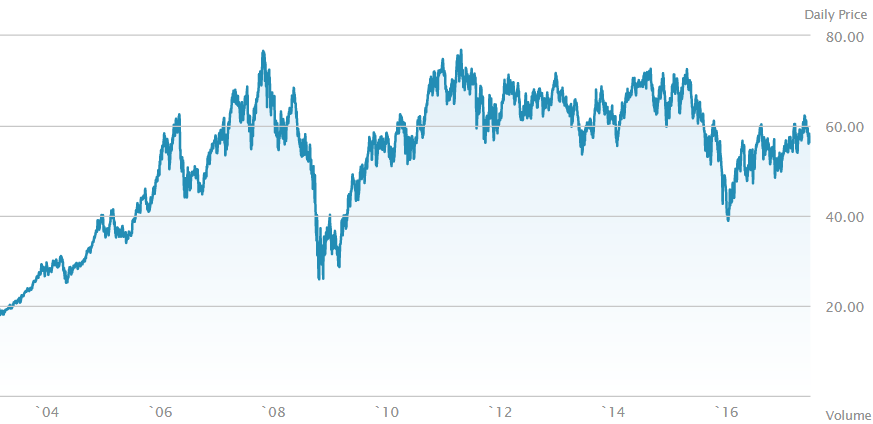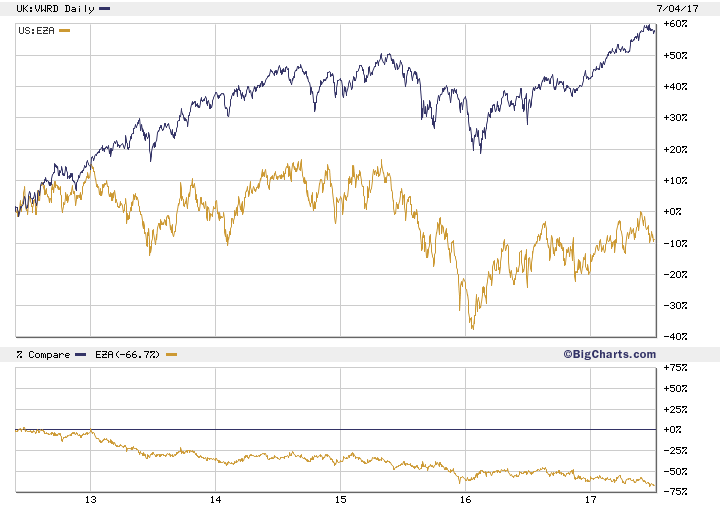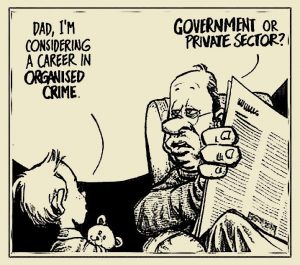This is not going to be a cheerful topic. We’re in a recession at the moment and there’s very little laughter around. The (no.) 1 person who is laughing isn’t helping cheer us up either. The mood in the country is miserable, David Shapiro from Sasfin Securities says the country is at the lowest level he’s ever seen. There are posts all over the forum complaining about how poor the JSE’s performance has been this year:
“This is a bad bad year…”
“Wow, ArcelorMittal @ R5 level and Lonmin @ R10 Level, Nice ANC nice …”
“It’s mind boggling. Almost as if there’s a committee somewhere who try come up with the most damaging own goals around.”
“Pretty damn sad that an inflation ETF is in the top 6 of the investor challenge. This must be the worst year so far for the challenge.”
“Zuma, Gigaba, PP Busisiwe Mkhwebane and Zwane are competing on who can destroy the SA markets the most. SA market up 1,9% since January while the emerging market index is up 17%”
The competition confirms the situation. We have 319 contestants this year, and only 60 have made any profit. But that’s actually far more optimistic than reality. Because inflation eats up the value of our currency at a fairly rapid 6% a year. Only 11 contestants are actually in profit after inflation, the other 308 have lost money in this challenge. I would say thank goodness it’s only a game, but sadly this is what’s happening to anyone who invests in South Africa too, right down to the mine worker who probably has no idea his pension fund is shrinking in value rather than growing over time.
Sounds pretty bad right? Sadly it’s far worse. If we ignore those funny bits of rapidly devaluing paper in our worn out wallets and use a real currency, we can see that South Africa has actually been a really bad economy to invest in for over a decade.
Let’s look at a chart: What we’re looking at here is the value of a fund that tracks the South African stock market in US Dollar terms. What’s pretty clear is that apart from the good run up to the start of 2006, and the short climb to 2008, the market has gone nowhere. No that’s a lie, it’s slowly devalued. No that’s also a lie, it’s mostly slowly devalued, and took a rapid nosedive following Nenegate in December 2015, and only attempted a half hearted recovery before the night of the long knives dragged it down again.
What we’re looking at here is the value of a fund that tracks the South African stock market in US Dollar terms. What’s pretty clear is that apart from the good run up to the start of 2006, and the short climb to 2008, the market has gone nowhere. No that’s a lie, it’s slowly devalued. No that’s also a lie, it’s mostly slowly devalued, and took a rapid nosedive following Nenegate in December 2015, and only attempted a half hearted recovery before the night of the long knives dragged it down again.
Amazingly, the price for a piece of South Africa today, is almost exactly the same as it was 11 and a half years ago. If you were a foreign investor way back in January 2006 and saw the great returns that had been made in the previous three years and put all your money here, all you’d have gained was a heart condition from all the stress you’ve been through.
That’s why there’s always that little warning on the bottom of fund fact sheets “Past performance is no indicator to future performance”. They should have added “especially when you have a useless and/or corrupt government in place”.
On the street things are the same. My dad is in car sales. He’s noticed a trend lately where people are trading in big expensive cars for economical runarounds. One of his clients has recently moved from an R1 million+ Jeep SRT to a R200k Ford Fiesta. In SA that’s almost unheard of. People I know are having their companies close up and retrench all the staff.
Last month I had a mini 21st high school reunion of sorts. I was in London for the week which coincided with the sevens Rugby tournament. We managed to get together a group of nearly a dozen friends from my not-so-big matric group. Two of those had emigrated just two weeks before, and like the rest were all fairly high earners when they were in South Africa. More tax money being removed from our economy, remember the death spiral I spoke about earlier…
So let me be blunt. There are now only two reasons I can give as to why you should invest some of your money in South Africa.
- You have a tax free savings account (TFSA) and you load it all up every year with an ETF based on an economy that isn’t South Africa. This is the only way you can keep your money inside South Africa, and not risk losing most of it to an inept government, or ever increasing taxes.
- You have a retirement annuity (RA) – These magic accounts can save you a fortune in tax. This fortune in tax should (hopefully) be larger than the fortune you’re losing when the government screws up. And boy have they screwed up lately. There is a risk here though. A large portion of the money in an RA needs to be invested in South Africa, and needs South African companies to do well for it to grow. Fortunately many of these companies also work outside SA. The largest, Naspers, is practically 100% based on the Chinese market! If you’re curious, the RA my family uses, which not so co-incidently is also the cheapest RA in the country, is the Sygnia Skeleton Balanced 70 Fund (NOT the Sygnia Skeleton 70 Fund which sounds similar but is much more expensive). That’s not financial advice, as I’m not licensed to give it, it’s merely an interesting fact.
That’s it, there is literally no other reason to invest in this country right now. Not one. Not even half a reason. You might try and argue that you can also buy those foreign based ETFs listed on the JSE with the rest of your money but you’re wrong, because as we saw in this blog post, if you do try and invest offshore using Rand outside of your TFSA, you’ll end up paying way more in capital gains tax to the Guptas government than if you took it offshore.
Want more info on why investing in SA is bad for your wealth? Okay, lets take a look at another graph: This time I’ve compared a fund that tracks the whole world with a fund that just tracks South Africa. This one goes back to early 2013. It was when I first started investing in the market. Before that I was purely in property. During almost all that time, I was exclusively invested in South Africa, it was the easier option, felt like the right thing to do, and all the experts said it was what I should do with most of my money. Their reason was that you should always invest in your own currency to protect yourself from currency fluctuation. One even asked me “What would you do if you invested in Dollars and the rand suddenly strengthened. You’d end up losing money”. Funny man that one.
This time I’ve compared a fund that tracks the whole world with a fund that just tracks South Africa. This one goes back to early 2013. It was when I first started investing in the market. Before that I was purely in property. During almost all that time, I was exclusively invested in South Africa, it was the easier option, felt like the right thing to do, and all the experts said it was what I should do with most of my money. Their reason was that you should always invest in your own currency to protect yourself from currency fluctuation. One even asked me “What would you do if you invested in Dollars and the rand suddenly strengthened. You’d end up losing money”. Funny man that one.
I listened to them, I remained optimistic, and I kept pouring money into the local market. That changed for me on the 9th of December 2015 at around 8pm. I remember the time well. In just a few days during that massive crash of the rand and stock market, my paper losses in US$ terms amounted to multiple years worth of my salary.
Had I not listened to them way back in 2013, and instead put my money into the ETF I now do, the Vanguard All World ETF (VWRD) marked in blue on the chart above, I would have over 40% more than I do today. That would mean I wouldn’t be sitting under the covers trying to escape the Joburg winter while writing this as I’d be retired and traveling the world today.
So what are you to do then?
1) If you haven’t already, open a tax free savings account that let’s you buy ETFs on the stock market.
There are really only two I could recommend at the moment, Easy Equities, and ABSA stockbrokers. These two are cheap to run, and give you access to all the ETFs available, so when a new better (that generally means cheaper) ETF comes out, you can switch. I’ll be doing this soon as I currently use rather expensive Deutsche Bank international ETFs and Satrix is about to launch much cheaper competing funds. Put R33 000 into it every year, and if they increase the amount you should too. Start one for each of your kids too while you’re at it.
2) Start taking money offshore
If you’re not convinced yet you might want to learn more about the efficient market hypothesis. Would you put all your money into one share? No that’s crazy, every adviser will tell you that’s financial suicide, but then is putting it all into one economy any more sane?
Getting money offshore used to be something really difficult. I remember stories of people being paid to go on holiday so they could help a relative take money offshore. Families used to buy yachts and sail them overseas to sell at foreign ports. At times woman used to wear really expensive jewellery and sell it at their destinations. This isn’t a joke, eventually a law was passed limiting people to carrying “an appropriate amount of jewellery” for their holiday travel.
Nowadays this is far simpler. You’re allowed to take R1 million offshore a year with practically no questions asked. You can take another R10 million a year as long as your taxes are in order. Last year I moved a fair amount offshore, and the procedure wasn’t actually that bad.
If there’s interest in the topic, I could put together a dummies guide to offshore investing. Let me know. Edit, there was interest, here‘s the post.
*Of course I may be completely wrong in all of this and the corrupt will be arrested, charged and put away and be replaced by honest, intelligent hardworking politicians, sending our currency and economy skyrocketing for years.
